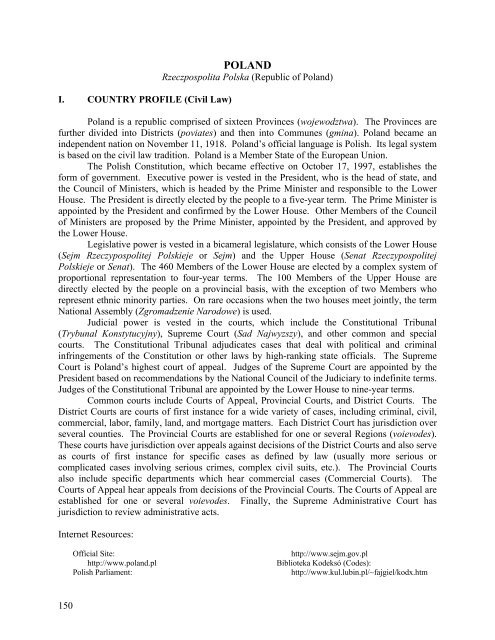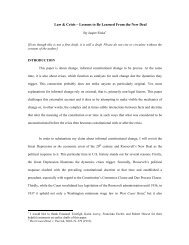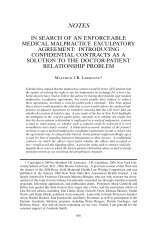Guide to Foreign and International Legal Citations - New York ...
Guide to Foreign and International Legal Citations - New York ...
Guide to Foreign and International Legal Citations - New York ...
You also want an ePaper? Increase the reach of your titles
YUMPU automatically turns print PDFs into web optimized ePapers that Google loves.
I. COUNTRY PROFILE (Civil Law)<br />
150<br />
POLAND<br />
Rzeczpospolita Polska (Republic of Pol<strong>and</strong>)<br />
Pol<strong>and</strong> is a republic comprised of sixteen Provinces (wojewodztwa). The Provinces are<br />
further divided in<strong>to</strong> Districts (poviates) <strong>and</strong> then in<strong>to</strong> Communes (gmina). Pol<strong>and</strong> became an<br />
independent nation on November 11, 1918. Pol<strong>and</strong>’s official language is Polish. Its legal system<br />
is based on the civil law tradition. Pol<strong>and</strong> is a Member State of the European Union.<br />
The Polish Constitution, which became effective on Oc<strong>to</strong>ber 17, 1997, establishes the<br />
form of government. Executive power is vested in the President, who is the head of state, <strong>and</strong><br />
the Council of Ministers, which is headed by the Prime Minister <strong>and</strong> responsible <strong>to</strong> the Lower<br />
House. The President is directly elected by the people <strong>to</strong> a five-year term. The Prime Minister is<br />
appointed by the President <strong>and</strong> confirmed by the Lower House. Other Members of the Council<br />
of Ministers are proposed by the Prime Minister, appointed by the President, <strong>and</strong> approved by<br />
the Lower House.<br />
Legislative power is vested in a bicameral legislature, which consists of the Lower House<br />
(Sejm Rzeczypospolitej Polskieje or Sejm) <strong>and</strong> the Upper House (Senat Rzeczypospolitej<br />
Polskieje or Senat). The 460 Members of the Lower House are elected by a complex system of<br />
proportional representation <strong>to</strong> four-year terms. The 100 Members of the Upper House are<br />
directly elected by the people on a provincial basis, with the exception of two Members who<br />
represent ethnic minority parties. On rare occasions when the two houses meet jointly, the term<br />
National Assembly (Zgromadzenie Narodowe) is used.<br />
Judicial power is vested in the courts, which include the Constitutional Tribunal<br />
(Trybunal Konstytucyjny), Supreme Court (Sad Najwyzszy), <strong>and</strong> other common <strong>and</strong> special<br />
courts. The Constitutional Tribunal adjudicates cases that deal with political <strong>and</strong> criminal<br />
infringements of the Constitution or other laws by high-ranking state officials. The Supreme<br />
Court is Pol<strong>and</strong>’s highest court of appeal. Judges of the Supreme Court are appointed by the<br />
President based on recommendations by the National Council of the Judiciary <strong>to</strong> indefinite terms.<br />
Judges of the Constitutional Tribunal are appointed by the Lower House <strong>to</strong> nine-year terms.<br />
Common courts include Courts of Appeal, Provincial Courts, <strong>and</strong> District Courts. The<br />
District Courts are courts of first instance for a wide variety of cases, including criminal, civil,<br />
commercial, labor, family, l<strong>and</strong>, <strong>and</strong> mortgage matters. Each District Court has jurisdiction over<br />
several counties. The Provincial Courts are established for one or several Regions (voievodes).<br />
These courts have jurisdiction over appeals against decisions of the District Courts <strong>and</strong> also serve<br />
as courts of first instance for specific cases as defined by law (usually more serious or<br />
complicated cases involving serious crimes, complex civil suits, etc.). The Provincial Courts<br />
also include specific departments which hear commercial cases (Commercial Courts). The<br />
Courts of Appeal hear appeals from decisions of the Provincial Courts. The Courts of Appeal are<br />
established for one or several voievodes. Finally, the Supreme Administrative Court has<br />
jurisdiction <strong>to</strong> review administrative acts.<br />
Internet Resources:<br />
Official Site:<br />
http://www.pol<strong>and</strong>.pl<br />
Polish Parliament:<br />
http://www.sejm.gov.pl<br />
Biblioteka Kodeksó (Codes):<br />
http://www.kul.lubin.pl/~fajgiel/kodx.htm
















